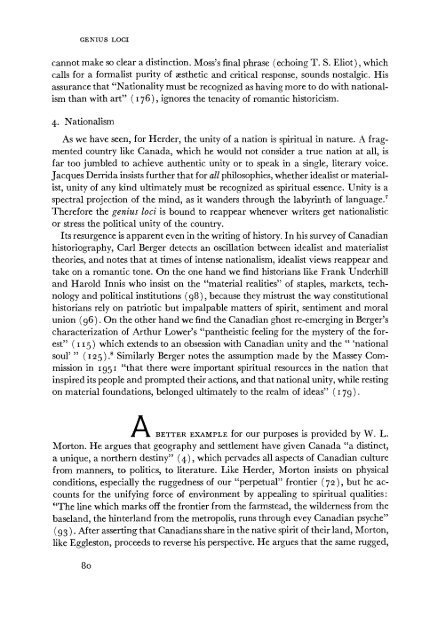GENIUS LOCI
GENIUS LOCI
GENIUS LOCI
Create successful ePaper yourself
Turn your PDF publications into a flip-book with our unique Google optimized e-Paper software.
<strong>GENIUS</strong> <strong>LOCI</strong><br />
cannot make so clear a distinction. Moss's final phrase (echoing T. S. Eliot), which<br />
calls for a formalist purity of assthetic and critical response, sounds nostalgic. His<br />
assurance that "Nationality must be recognized as having more to do with nationalism<br />
than with art" ( 176), ignores the tenacity of romantic historicism.<br />
4. Nationalism<br />
As we have seen, for Herder, the unity of a nation is spiritual in nature. A fragmented<br />
country like Canada, which he would not consider a true nation at all, is<br />
far too jumbled to achieve authentic unity or to speak in a single, literary voice.<br />
Jacques Derrida insists further that for all philosophies, whether idealist or materialist,<br />
unity of any kind ultimately must be recognized as spiritual essence. Unity is a<br />
spectral projection of the mind, as it wanders through the labyrinth of language. 7<br />
Therefore the genius loci is bound to reappear whenever writers get nationalistic<br />
or stress the political unity of the country.<br />
Its resurgence is apparent even in the writing of history. In his survey of Canadian<br />
historiography, Carl Berger detects an oscillation between idealist and materialist<br />
theories, and notes that at times of intense nationalism, idealist views reappear and<br />
take on a romantic tone. On the one hand we find historians like Frank Underbill<br />
and Harold Innis who insist on the "material realities" of staples, markets, technology<br />
and political institutions ( 98 ), because they mistrust the way constitutional<br />
historians rely on patriotic but impalpable matters of spirit, sentiment and moral<br />
union ( 96 ). On the other hand we find the Canadian ghost re-emerging in Berger's<br />
characterization of Arthur Lower's "pantheistic feeling for the mystery of the forest"<br />
(115) which extends to an obsession with Canadian unity and the " 'national<br />
soul' " (125). 8 Similarly Berger notes the assumption made by the Massey Commission<br />
in 1951 "that there were important spiritual resources in the nation that<br />
inspired its people and prompted their actions, and that national unity, while resting<br />
on material foundations, belonged ultimately to the realm of ideas" (179).<br />
A BETTER<br />
EXAMPLE for our purposes is provided by W. L.<br />
Morton. He argues that geography and settlement have given Canada "a distinct,<br />
a unique, a northern destiny" (4), which pervades all aspects of Canadian culture<br />
from manners, to politics, to literature. Like Herder, Morton insists on physical<br />
conditions, especially the ruggedness of our "perpetual" frontier (72), but he accounts<br />
for the unifying force of environment by appealing to spiritual qualities:<br />
"The line which marks off the frontier from the farmstead, the wilderness from the<br />
baseland, the hinterland from the metropolis, runs through evey Canadian psyche"<br />
( 93 ). After asserting that Canadians share in the native spirit of their land, Morton,<br />
like Eggleston, proceeds to reverse his perspective. He argues that the same rugged,<br />
80

















